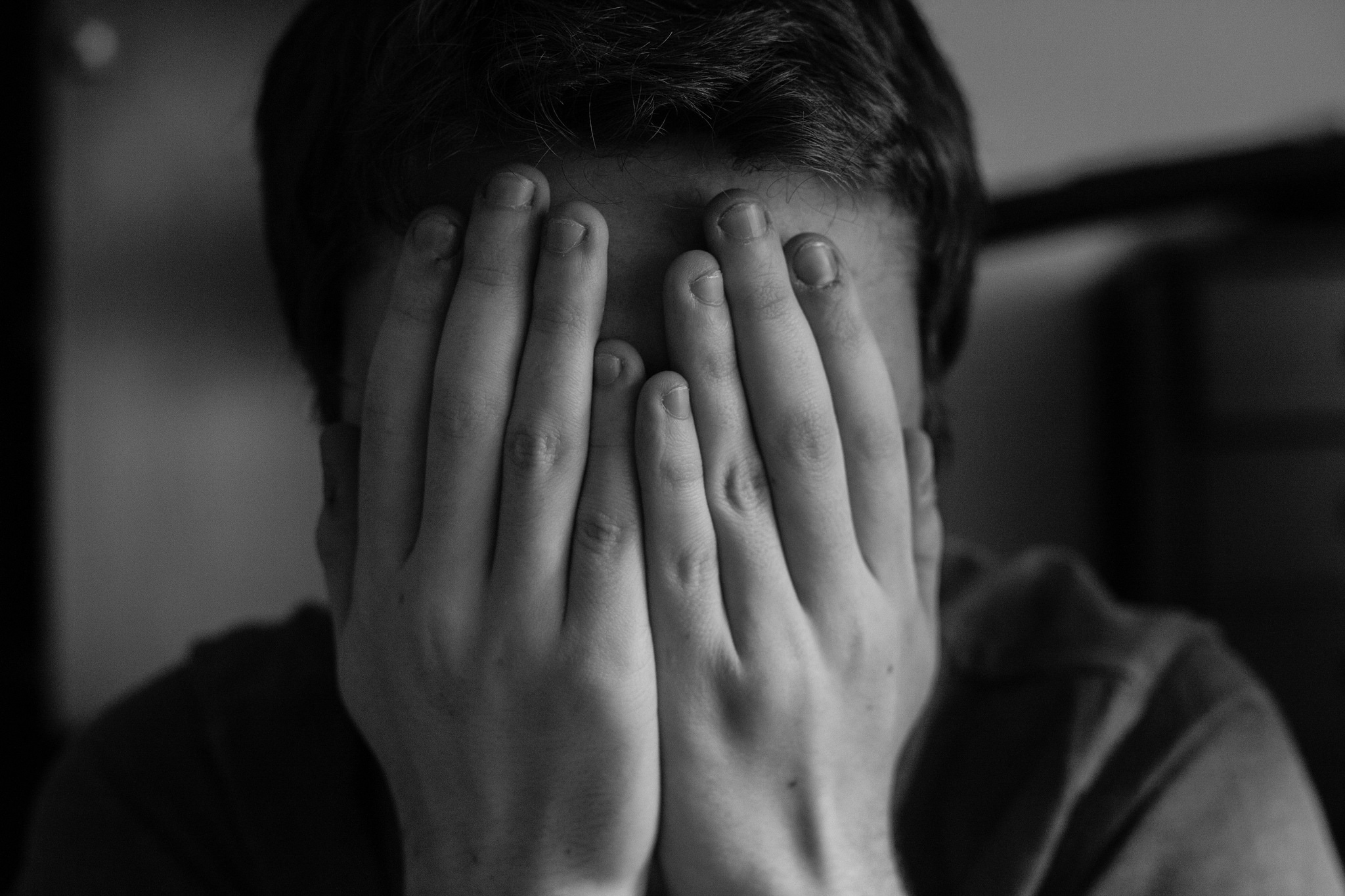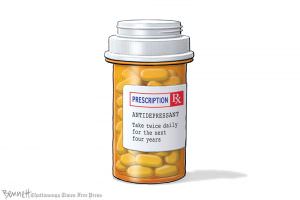Why Depression Is Rampant in Our Times
An interview with Johann Hari, the author of a groundbreaking new book on the roots of depression. ryan melaugh / CC BY 2.0
ryan melaugh / CC BY 2.0
When British journalist Johann Hari was 18 years old, he became so depressed that he went to his family physician for treatment to end his despair. Hari’s mom had suffered from depression throughout his coming of age, and he had seen numerous television programs report that low mood was inherited, innate, carried in the genes of those who agonized.
Hari’s doctor confirmed this but added that depression was also caused by a chemical imbalance—a lack of serotonin—that could easily be corrected with medication. The teenaged Hari was instantly relieved, eager to take whatever concoction was necessary to restore his confidence and equilibrium.
Unfortunately, the cure turned out to be far more illusory than Hari expected and in short order his depression returned. His doctor’s solution was to up his dosage of Paxil before switching him to Prozac.
It’s been 20 years since Hari took his first anti-depressant—something he did for 13 years—and the intervening decades have taught him a great deal about the fallacies surrounding mental health and its management. For one, he learned that depression and anxiety have biological, psychological and social triggers, and need treatments that tap into each part of this triumvirate.
He discovered that consumers in much of the world have been sold a false bill of goods. The result? Unwarranted confidence in pharmaceutical solutions to the anomie caused by fraying social ties, rampant consumerism, and unsatisfying work. This, of course, has boosted the bottom line of drug companies while doing little-to-nothing to alleviate the stress, strain, and trauma of contemporary life.
Hari’s Lost Connections: Uncovering the Real Causes of Depression and the Unexpected Solutions (Bloomsbury) zeroes in the social change that is needed to restore better relationships on the job, in families, and in the neighborhoods we call home. The book is part memoir, part investigative report and part expose of the ways consumers have been hoodwinked into relying on medication to relieve emotional distress.
Hari spoke to AlterNet reporter Eleanor J. Bader via Skype in late January, several days after Lost Connections was released.
Transcript:
Eleanor J. Bader: You knew from personal experience that anti-depressants typically do not work for very long. Many readers will find this shocking. As you did your research, did you find anything that surprised you?
Johann Hari: There were a lot of things that were really jarring. Let me start by saying that as a teenager, I went to the doctor because the pain was leaking out of me and I couldn’t control or regulate it. My doctor said I needed a drug to boost my serotonin level but after taking the pills I was still depressed and I wanted to know why. This has been a long journey. I spent three-and-a-half years researching and writing Lost Connections but I’ve been thinking about these issues for far, far longer.
Once I began my research I was excited, and somewhat surprised, to learn that what I’d been told about having a chemical imbalance was just not true. I was told that anti-depressant drugs cured depression and would make me and others well. Yes, anti-depressant drugs expand the options; I do not want to take anything away since medications do benefit some people, but the degree to which the drug companies lied about or were selective about the findings they reported to the Food and Drug Administration about each drug’s efficacy is incredible. The failure of regulators to probe more deeply before okaying a drug is shocking.
We’ve basically given doctors one lever to pull. As a culture we need to give doctors more options for treatment because it turns out our mental health is a social indicator and it needs social solutions.
As a teenager I thought depression was all in my head. I considered myself weak. Then I thought it was a chemical imbalance. I’ve now discovered that there are biological causes of depression, but the causes are also social and how we live can explain why many people feel so awful.
Bader: Lost Connections talks about the social causes of depression and mentions our increasing lack of control over our work lives. It also delves into our reliance on technology over human relationships. Please say more about this.
Hari: For thousands of years we’ve known that if you think life is only about money and status, you’ll feel miserable. We know that a steady diet of junk food will make you sick. A steady diet of junk values does the same thing.
I interviewed Dr. Tim Kasser, an American psychologist, who has identified intrinsic and extrinsic values in our lives. An intrinsic value is something you do for the joy of doing it. An extrinsic value is something you do because you have to. Dr. Kasser found that when societies move toward extrinsic values, depression increases.
A few years ago, Melania Trump was asked if she would have married Donald if he was not rich. Her answer was stunning. Do you think he would he have married me if I was not beautiful? she replied. This is a clear example of living extrinsically.
Dr. Kasser did an experiment where he got a bunch of five-year-old kids together. Half of the kids were shown two adverts and half were not. Later, the kids were asked to choose between playing with a nasty kid who had the toy mentioned in the ads, or playing with a nice kid without it. Those children who saw the adverts favored the nasty kid with the toy. This is the promotion of junk values. It’s as if we’re being fed KFC for the soul.
All of us know the Golden Rule. I think we now need to think about the “I Want Golden Things” rule that is so dominant. We have to ask ourselves how we define what we value. We have to expose the hollowness of extrinsic values and focus on what we want out of life.
I have a concrete example that comes from Baltimore Bike Works (BBW), a cooperative bicycle repair business in Baltimore, Maryland. The people who founded it, a couple who had both been working soulless, depressing jobs, got fed up, quit, and went on to create a democratically-run cooperative where everyone does both the good and bad jobs. Everyone at BBW shares profits and decision making. I spoke to a lot of the workers and most of them told me they’d been depressed before they got involved in the cooperative. Most of them had fixed bikes before and were fixing bikes now, so they were doing the same work. The fact that they were no longer part of a top-down machine, but we instead able to control the workplace themselves, made the difference.
It comes down to consciousness raising, helping people envision a social reorganization that will give them more say in their lives.
Bader: As a society, we tend to downplay emotions, as if expressing fear, pain, or grief is wrong or inappropriate. You interviewed therapist Joanne Cacciatore, who argues the opposite, that we have to be able to talk about our emotional struggles. That sounds so much healthier to me.
Hari: Back in the 1970s, psychologists came up a checklist for depression, which ticked off things like low mood and feelings of worthlessness. If a person’s symptoms matched five or more items on the list, they were considered depressed. There was one exception; if you were grieving for someone who had died, doctors assumed you had a legitimate reason to be depressed. It became known as the grief exemption. People then asked about other life events—loss of a job, divorce, homelessness, bankruptcy—and rather than revise the checklist to include these events, they eliminated the grief exception.
Joanne Cacciatore, who herself lost a child, told me that 32 percent of grieving parents are drugged within the first few days of losing a child. If this isn’t a sign that we don’t know how to understand acute pain, I don’t know what is. It seems like a feature of neoliberal politics or neoliberal values: If you are in pain, it’s your job to drug yourself so you can get back to work as quickly as possible.
Joanne explained to me that when we look at suffering, we ignore the context. As far as I’m concerned, context is everything.
Bader: You interviewed Dr. Sam Everington, an East London doctor, whose solutions to depression included community involvement. How does social engagement lift people out of depression?
Hari: Sam worked in a clinic is an area of London with a lot of poverty and when he spoke to his patients he saw that many of them were lonely and insecure. One woman, Lisa Cunningham, had virtually shut herself away in her home for seven years. Sam asked her to participate in a group that was going to clear Dog Shit Alley. He asked her to go to the site a couple of times a week and work with folks there. The goal was to make the space into something beautiful.
As people came together, they cleared to alley, talked to each other, and taught one another gardening skills. The space they created is quite wonderful. When I interviewed Lisa, she told me that as the garden began to bloom, so did the once-depressed and anxious volunteers.
Neoliberalism sees human beings as rational economic maximizers. Americans and Europeans have organized our whole society around this idea. But this is not what human beings are, and taking anti-depressant drugs to cope is not the solution. It’s like putting a leash on a pet. Drugs control us, rein us in, but they also disconnect us from the causes of our pain.
Bader: What social supports and changes are necessary to restore or at least improve human connectedness?
Hari: It is very strange that we put the full onus for solving depression and anxiety on people who are ill and the doctors who treat them.
When there are problems with other systems we don’t do this. Take cars. When we noticed safety problems, we came up with seat belts and speed limits and did not leave it to drivers to figure out what to do.
Helping reduce depression is a job for all of us. It starts with raising consciousness to help people see why they are depressed and anxious.
Workplace changes are key. A recent Gallup poll found that just 13 percent of people who were questioned said they like their jobs. Nearly a quarter, 24 percent, said they hate what they do and another 63 percent said that they basically sleepwalk through their days. This means that 87 percent of people are unengaged by their employment.
We know that giving people control at work, where they have input into the overall operation and have a say in finding solutions to problems, improves workplace satisfaction. So why not do this?
Bader: Are there other material changes that would help to alleviate depression?
Hari: There was an experiment done in Dauphin, Manitoba, in the mid-1970s that gave people a guaranteed annual income, about $15,000 a year in today’s dollars. Once it was implemented, the doctors noticed a significant decrease in mood disorders and hospital admissions for depression fell by nine percent over three years.
When people live with pervasive financial insecurity it makes them feel bad. A guaranteed income, on the other hand, allows people to make changes in their lives. It gives them a financial margin so they can quit a job, leave an abusive partner, move somewhere better, or decide what to do with their time. Unfortunately, the income guarantee was discontinued when a conservative government took power in 1979. It’s too bad since we know that when social equality increases, mental health improves.
Bader: Are these findings also true for people diagnosed with bipolar disorder or post-partum depression?
Hari: All depression has a biological aspect to it, but none are purely caused by biological factors. There are psychological and social aspects to all types of depression but they vary from person to person.
When it comes to bipolar disorder, most doctors agree that there is a bigger biological slice. Still, even here, social factors can aggravate and intensify the condition.
Post-partum depression is likely tied in to the way we live. It takes a community to raise children. We ignore this and tend to see childrearing as an individual family’s responsibility . The isolation can then lead to depression and anxiety.
Bader: Let’s talk about you…Are you still depressed?
Hari; Actually, I’m in a really great place now. I am in a privileged position; I was able to change my life and find meaningful, engaged work and great friendships.
Bader: Do you think we have any reasons to feel optimistic about winning social change given the political climate under Trump?
Hari: I am a gay man and in my life time I’ve seen the world transform. When Andrew Sullivan wrote a book about the need for gay marriage in the 1990s, people thought he was insane. Twenty-five years later, his book was quoted by the Supreme Court In its marriage equality ruling. The White House has been lit in the colors of the rainbow and a Black man became the US president. We don’t know what will happen next. Of course, Trump is a catastrophe and a profound danger to the human race. Nonetheless, the fact that alarm bells are ringing all over the world tells me that we are not going back and we won’t let him destroy us.
Your support matters…Independent journalism is under threat and overshadowed by heavily funded mainstream media.
You can help level the playing field. Become a member.
Your tax-deductible contribution keeps us digging beneath the headlines to give you thought-provoking, investigative reporting and analysis that unearths what's really happening- without compromise.
Give today to support our courageous, independent journalists.









You need to be a supporter to comment.
There are currently no responses to this article.
Be the first to respond.